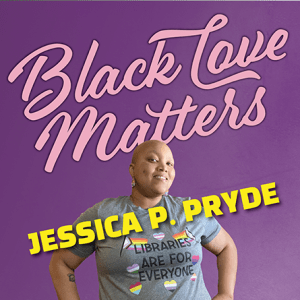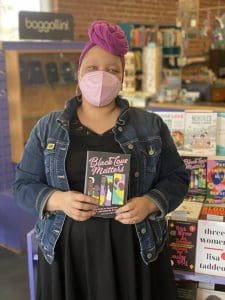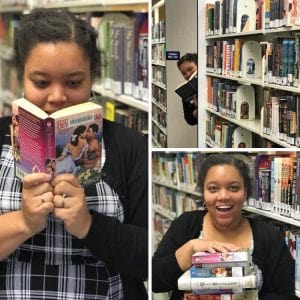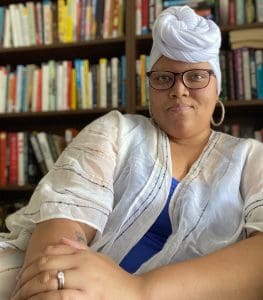Jessica Pryde is the online services librarian at Joel D. Valdez Library. She is a writer, reader, librarian, host of the When in Romance podcast, opens a new window, and Book Riot, opens a new window contributor. She earned an AB in the Interdisciplinary Project in the Humanities at Washington University in St. Louis and her MLIS at San Jose State University.
On February 12th from 10 to 11 am Jessica will kick off the Library's LGBTQ+ Services Committee's, opens a new window 25th anniversary Author Talk Series with a discussion about her new book Black Love Matters, opens a new window, a collection of essays which showcase Black voices in the romance genre, some of which are also queer voices. This event is presented in partnership with the Library's Kindred Team, opens a new window, of which Jessica is a member.
We sat down with Jessica to discuss her new book and her relationship with the romance genre.
Can you tell us a little bit about yourself?
I’m originally from Washington, DC but have lived in Tucson since 2014. I studied humanities in college, which means that I will be fascinated by anything history, literature, or arts related you ever start to tell me.
I love books. Books are basically my whole personality. I don’t read as much as I used to, but I love it when I do. I write a lot about books and reading, and occasionally dip into fiction (I’m not very good). Oh, and I’m also the Online Services Librarian at PCPL, which probably means nothing to the average person.
What sparked the creation of this book?
I was reading Well-Read Black Girl , opens a new windowby Glory Edim, which is a fantastic anthology featuring reflections by writers of various kinds about when they first saw themselves in literature. A lot of it called to me as a young, cis Black woman, but I noticed that none of the contributors were (openly) romance readers. I wondered what a book like that would look like from the point of view of Black folks who started out the way I did, with romance. I started an informal conversation with an agent I knew who had once been a romance editor about whether it was an interesting concept, and the rest is history.
What do you want readers to get out of this book?
I’m hoping that there is something that will be meaningful to all kinds of readers, whether they share my background and that of the other contributors, or are reading it to understand our points of view. The most important takeaways are that representation is key in every situation, especially those of the marginalized; and that Black people, especially, deserve to have that representation in romantic media, where love, hope, and joy are the ultimate happy endings.
What has your relationship been with reading romance books? What do you like most about the genre?
Romance books have come in and out of my life for the entirety of my experience reading books, but they have pretty firmly established themselves as my primary literary love. I first started reading them as a curious tween pulling books off of my mother’s, grandmother’s, and aunt’s shelves, in search of something more interesting than the too-simple books I’d amassed as a kid. I read them here and there through grade school, latching onto a few specific series until diving back in after library school, when I got my first ereader. They’ve sort of taken over my life ever since.
The best thing, for me, about romance, is the formula. I know, I know. But there’s a difference between formulaic and having a guaranteed structure that people can play around with. I can pick up a romance with a guarantee that two or more people are going to fall in love and they’ll be together in some capacity when the book ends. Anything can happen, because I know everything will turn out well in the end. It’s the same reason I love superhero movies. (Well, most of them end that way.) Also, I love character development and growth and watching people fall in love and become their best selves for their future partner is so great.
What was the process of creating this book like?
I had to think a lot about what I wanted out of it at the very beginning, because getting a nonfiction book like this published requires a plan—in this case, a proposal that includes potential contributors, marketing strategy, and samples (some of which will never again see the light of day). So I had to put on my big girl pants and reach out to some people in the industry that I heavily admired to ask if they wanted to be a part of the project. And I had to figure out how to put all of their words together once they started coming in. Before anything even made it to the Berkley editors, I read every word in this book at least five times. And then a few more afterwards. There’s this big gap in the middle where it doesn’t feel like you wrote a book, because it’s going through copyediting and fact checking and marketing plans and all the things that happen in New York. And then, you see the finished product and it’s like no other feeling in the world.
What do you enjoy most about librarianship?
Did I mention books are my whole personality? Now, I don’t actually work with books on a regular basis and being a librarian is obviously about more than books and reading all day. But I love that the work I do allows me to share my love of books with others by writing about them for the website, working with Ravenous Readers, our readers’ advisory team, and leading book clubs (learn more about these clubs—Rainbow Reads, opens a new window and #ReadBlack, opens a new window) geared towards two of my specific areas of intersection.
What advice would you give to a young writer?
Keep going. Write what you want, about what you want, and eventually you’ll figure out what you like about it. Someday, it might be part of your job! Or your whole job, even. But no matter what, don’t let anyone take your joy of writing away from you.
What advice would you give to someone who is new to reading the romance genre?
Try a lot of it! Some people will pick up one romance they didn’t like and decide they don’t like the genre. But there are about fifty romances published every week (and that’s just traditionally) and they run the gamut of subgenres, time periods, and themes. Maybe you read a contemporary friends to lovers romance about a cowboy. Can I introduce you to this book where two Black lesbians who have never met have to pretend to be engaged to win a prize on a reality show? Or maybe this Reconstruction era mail order bride story with two grooms? There’s honestly something for everyone, unless you just don’t like reading about people falling in love. Because that’s a requirement.
If you could hang out with any romance writer living or dead who would it be?
Beverly Jenkins, opens a new window. The GOAT.
What are you reading right now?
I’m reading… a lot of things right now. The 1619 Project , opens a new windowby Nikole Hannah-Jones for #ReadBlack. Looking for Lorraine , opens a new windowby Imani Perry for the Read Harder, opens a new window podcast. The Soulmate Equation , opens a new windowby Christina Lauren and The Inheritance of Orquídea Divina, opens a new window by Zoraida Córdova for the Tucson Festival of Books, opens a new window. And Ramón and Julieta , opens a new windowby Alana Quintana Albertson, just for me.






